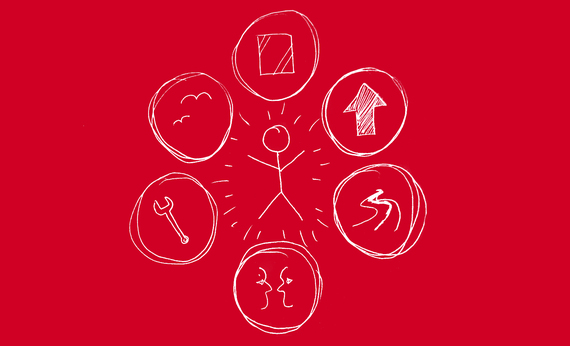
Professor Carol Ryff studied well-being before it was cool. Twenty years before we all start talking about well-being and thriving, Ryff was already quietly working on the problem at the University of Wisconsin-Madison.
She ended up creating one of the first systematic models of psychological well-being, and her model remain one of the most scientifically verified and empirically rigorous today.
Carol Ryff was motivated by two things: Firstly,well-being should not be restricted to medical or biological descriptions -- instead it is a philosophical question about the meaning of a good life. Secondly, current psychological theories of well-being at that time lacked empirical rigor -- they had not been and could not be tested.
To construct a theory that joins philosophical questions with scientific empiricism, Ryff mined for building blocks in a diverse selection of well-being theories and research, from Aristotle to John Stuart Mill, from Abraham Maslow to Carl Jung. She identified the recurrence and convergence across these diverse theories, and these intersections gave her the foundation for her new model of well-being.
Carol Ryff's model of psychological well-being differs from past models in one important way: Well-being is multidimensional and not merely about happiness or positive emotions. A good life is balanced and whole, engaging each of the different aspects of well-being, instead of being narrowly focused. Ryff roots this principle in Aristotle's Nichomachean Ethics, where the goal of life isn't feeling good but is instead about living virtuously.
Carol Ryff's six categories of well-being are:
1) Self-Acceptance
High Self Acceptance: You possess a positive attitude toward yourself; acknowledge and accept multiple aspects of yourself including both good and bad qualities; and feel positive about your past life.
Low Self Acceptance: You feel dissatisfied with yourself; are disappointed with what has occurred in your past life; are troubled about certain personal qualities; and wish to be different than what you are.
2) Personal Growth
Strong Personal Growth: You have a feeling of continued development; see yourself as growing and expanding; are open to new experiences; have the sense of realizing your potential; see improvement in yourself and behavior over time; are changing in ways that reflect more self-knowledge and effectiveness.
Weak Personal Growth: You have a sense of personal stagnation; lack the sense of improvement or expansion over time; feel bored and uninterested with life; and feel unable to develop new attitudes or behaviors.
3) Purpose in Life
Strong Purpose in Life: You have goals in life and a sense of directedness; feel there is meaning to your present and past life; hold beliefs that give life purpose; and have aims and objectives for living.
Weak Purpose in Life: You lack a sense of meaning in life; have few goals or aims, lack a sense of direction; do not see purpose of your past life; and have no outlook or beliefs that give life meaning.
4) Positive Relations With Others
Strong Positive Relations: You have warm, satisfying, trusting relationships with others; are concerned about the welfare of others; are capable of strong empathy, affection, and intimacy; and understand the give and take of human relationships.
Weak Relations: You have few close, trusting relationships with others; find it difficult to be warm, open, and concerned about others; are isolated and frustrated in interpersonal relationships; and are not willing to make compromises to sustain important ties with others.
5) Environmental Mastery
High Environmental Mastery: You have a sense of mastery and competence in managing the environment; control complex array of external activities; make effective use of surrounding opportunities; and are able to choose or create contexts suitable to your personal needs and values.
Low Environmental Mastery: You have difficulty managing everyday affairs; feel unable to change or improve surrounding contexts; are unaware of surrounding opportunities; and lack a sense of control over the external world.
6) Autonomy
High Autonomy: You are self-determining and independent; are able to resist social pressures to think and act in certain ways; regulate behavior from within; and evaluate yourself by personal standards.
Low Autonomy: You are concerned about the expectations and evaluations of others; rely on judgments of others to make important decisions; and conform to social pressures to think and act in certain ways.
The Science
While an untested model is just a daydream, Carol Ryff's model of psychological well-being has faced continued waves of testing.
And her model has proved rather sturdy. Common to psychology, there is the squabbling over the questionnaires that try to measure the six criteria. However, in general, researchers working across diverse population samples found that the data supports and is best explained by a six-factor model.
Ryff's model also survived cross-culturally, with studies applying it successfully to populations in Spain and Columbia , in Sweden , and in Hong Kong.
Some contradictory evidence exists, arguing that the six criteria could be simplified, as large overlaps have been found. Other studies do not find this overlap , and Ryff argues that these inconsistent findings were due to overly short questionnaires, rather than the model itself.
Conclusion
Carol Ryff's model of psychological well-being provides a powerful framework through which to analyze and organize one's life and to generate ideas about how to live better. So why isn't the popular media talking about the model? Perhaps it is time Ryff hired better marketing staff. We'll all benefit.
David is a research editor at The Huffington Post. This article is the first in an article-series about the science behind well-being. For more, visit David's website, Living Meanings.